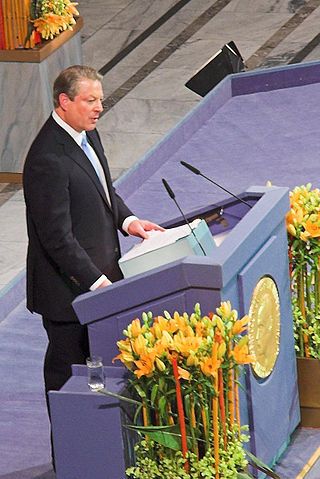From Guest Blogger John Robbins: Al Gore and the Role of Government in Our Energy Policy

Gore seems to believe RE and EE technologies are the only answers, which is FALSE and certainly MORE EXPENSIVE, maybe unaffordable in most peoples’ down-to-earth budgets. He correctly describes the anti-democratic trends in USA where only our largest corporations and most wealthy individuals now have most and sometimes only access to most of our media and political speech arenas. But he thinks centralized government policies hold our solutions, mentioning nothing about how to change a culture of modernites who have been taught and are now often addicted to ever-growing centralized services, provisions and actions by others instead of becoming more participating in the solutions we most need.
Gore likes the Internet’s ability to rise above and avoid the anti-democratic anti-inclusive situations in large media like TV, but he ignores that most Internet nowdays is full of propaganda, advertising and rumors, even becoming packed with the same kinds of high-cost anti-democratic corporate and special interest political marketing we once saw only on TV.
The main reason related to our energy and environment dilemmas that this matters is that so much of our current advertising and marketing in major media and Internet encourages consumers to buy and use more energy or energy-consuming products. We’re told to trust large energy suppliers, to buy more energy-guzzling vehicles, to drive too aggressively (thereby using more fuel), to support more military adventurism (by our forces, the most energy-guzzling in the world today), to buy larger homes and buildings, to eat too much, etc. Most of our current major media advertising encourages us to increase our consumption.
One of the best ways our governments can help is to stop encouraging more consumption or growth after something or somebody has already acquired or grown enough. Prices for all kinds of nonrenewable conventional energy should mandatorily rise and rise as usage volumes per month or year go up, giving lowest energy volume users the lowest prices (as is now normal for all electricity sales on US West Coast from Seattle to San Diego). Just imagine that declining marginal energy prices are still most common in most of USA, thereby giving lowest energy prices to largest volume users. We need to end pro-growth-ad-infinitum policies and subsidies. That would end continually encouraging growth in energy and other nonrenewble resources as we now have. New moneys collected from progressive pricing could be used to pay down public debts and fund more sustainable energy and resource programs.
I even think tax-free food has been taken too far. Maybe we should consider tax-free food only for fresh or unprocessed foods. After all, food is not only energy but its modern production and processing are very energy intensive.
Setting the marginal price-hike thresholds for “inclining block” or “progressive” energy pricing of all conventional energies including ngas, electricity and petroleum products would require much better public understanding of what’s high, average or low for energy use in any locale. This would be initially complicated but many electric utilities already inform their customers whether they are higher or lower than their neighbors. Right now most energy consumers do not know whether their usage is higher, average or lower. Most modern energy is invisible, out of sight and mind, so this is understandable. But the sooner we change this ignorance and begin charging more for excessive energy use, the better we will be positioned to expect change. Indeed, we see this same kind of change in our restaurants and packaged foods, which now often include nutrition and calorie information in hopes to change the overweight and obesity crisis in the USA population.
As with food, managing and reducing energy use is about better controlling outcome usage volumes. Most of our current energy programs and subsidies are more about rewarding for purchased products, processes and labels, not outcomes. We call those purchased things “prescriptions”. The outcomes are what we call “performance”. There are many countless examples of projects receiving subsidied prescriptions but still achieving rather poor or sub-average performance in terms of actual outcome volume of energy use. Gore says nothing about this, but I think it is essential, especially for educating and encouraging consumers of energy to use less. I teach, consult and design for lower-usage targets pre-negotiated with clients and students after first helping them understand their own current usage compared to local averages and ranges. This hopefully makes my process more consumer-friendly, easier to understand, easier to participate in.
Anyway, Gore is correct that we do need better leadership from our governments and corporations. But we also need a more doable and envisionable action plan at our grass roots, one that begins to discourage perpetual growth in energy demand. Reducing energy use makes it easier, more reliable and less expensive to convert to energy alternatives like most renewable energy options. There are many among us who are demonstrating very low energy use, often outside our current popular energy programs and subsidies. We should identify these examples and promote them broadly.
